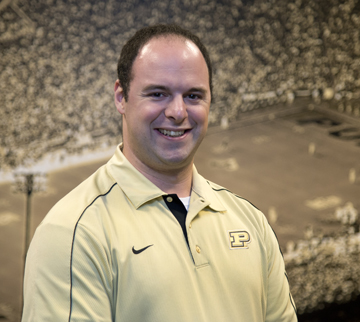Game Starters: Seth Schwartz
October 5, 2012
 |
|
Seth Schwartz, assistant
director of student services for Purdue Athletics. (Purdue University
photo/Mark Simons) |
Seth Schwartz understands how difficult it can be for students to juggle academics with athletics -- especially in an intense collegiate atmosphere.
As assistant director of student services for Purdue Athletics, Schwartz coordinates resources that set up student-athletes to succeed in the classroom. He also is one of two academic advisors to Purdue's football team, which consists of 105 players spanning myriad majors and courses of study.
What are your job responsibilities?
I oversee the football academic support program, meaning I monitor players' academic eligibility, their progress in individual classes and their progress toward their intended degrees. I also coordinate their study hall sessions.
All freshman and first-year transfer football players, as well as upperclassmen considered at-risk academically, are required to attend study hall sessions Sunday through Thursday at 8 p.m. The sessions are objective-based, meaning the student-athletes and advisors plan what needs to get done each night. Once their objectives are completed, the student-athlete is dismissed from study hall, which can last up until 10 p.m., depending on how much work the student needs to get finished.
We also employ undergraduates as tutors for specific classes. The student-athletes meet with those tutors as assigned or, if they want to meet more frequently, as requested.
What is the biggest challenge student-athletes face academically?
Perhaps more so than any other group of students on campus, student-athletes face a time crunch. For our football players, they have classes every day like any other student, but they also have to come to Mollenkopf Athletic Center every day for long periods of time. For example, they have team meetings every afternoon at 2:30; those meetings last until practice, which starts at 4:30 and ends around 6:45. After that, they have a short window of time to shower and eat dinner before study hall starts at 8 p.m. In between all of that, they still have to find time to do daily strength and conditioning, as well as rehabilitation if they are recovering from an injury.
Those are a lot of responsibilities for our players and, in particular, for the freshmen, who oftentimes are coming out of high school without the time management or sometimes without the study skills they need to succeed in this kind of environment. That's why it's important for them to have someone who can help them take a proactive approach to prioritizing their studies. Ideally, when we first encounter players as freshmen, we want to teach them the skills they need to succeed in the classroom for the next four to five years -- for the entirety of their time at Purdue.
What interested you in helping student-athletes with their academics?
I've been assistant director of student services since 2010, but I've actually been working in this or a similar capacity at Purdue since 2003, when I became a graduate assistant while studying sport management. I then became a full-time academic advisor for football, then was promoted to head academic advisor for football, then was promoted into my current job.
When I graduated from Purdue with a degree in communication in 2002, I knew I wanted to work in athletics, but I wasn't sure exactly what I wanted to do. Shortly after graduating, though, I became an intern at Austin Peay State University in Tennessee, where I gained some experience helping a variety of student-athletes with their academics. It was then that I realized that the work I'm doing now is the best of both worlds -- it's working in academics and it's working with student-athletes, and it's really helping them to reach their full academic potential. I take a lot of pride in watching them succeed.
What's the most rewarding part of your job?
For me, working with players who really appreciate the help we provide is very rewarding. These really are a good group of guys we're working with -- many of them, when they graduate, loudly voice their thanks for all the help we've given them. Being recognized like that by the student-athletes is a great feeling.
Looking forward, what are your professional goals?
Right now, we're working toward achieving a team-average GPA of 3.0. We're getting very close to that mark; in the near future, I think we'll meet it. Reaching that average GPA is a goal coach Danny Hope has expressed. As coach Hope has expressed, if the team can achieve this goal in the classroom, we're confident it will help them achieve their goals on the field.
Writer: Amanda Hamon, 49-61325, ahamon@purdue.edu

